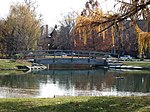German Village
German-American culture in OhioGerman-American historyGerman VillageGerman communities in the United StatesHistoric districts in Columbus, Ohio ... and 4 more
Historic districts on the National Register of Historic Places in OhioNRHP infobox with nocatNational Register of Historic Places in Columbus, OhioNeighborhoods in Columbus, Ohio

German Village is a historic neighborhood in Columbus, Ohio, just south of the city's downtown. It was settled in the early-to-mid-19th century by a large number of German immigrants, who at one time comprised as much as a third of the city's entire population. It became a city historic district in 1960 and was added to the National Register of Historic Places in 1974, becoming the list's largest privately funded preservation district, and in 2007, was made a Preserve America Community by the federal government. In 1980, its boundaries increased, and today it is one of the world's premier historic restorations.
Excerpt from the Wikipedia article German Village (License: CC BY-SA 3.0, Authors, Images).German Village
Thurman Avenue, Columbus South Columbus
Geographical coordinates (GPS) Address External links Nearby Places Show on map
Geographical coordinates (GPS)
| Latitude | Longitude |
|---|---|
| N 39.945833333333 ° | E -82.992777777778 ° |
Address
German Village
Thurman Avenue
43206 Columbus, South Columbus
Ohio, United States
Open on Google Maps









